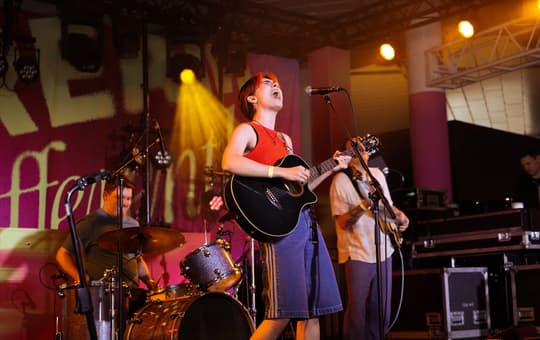
A Love Letter to collective listening
Earlier this year, The Otolith Group proposed a public playback of a ninety-minute ‘audio essay’, londonunderlondon, which I and a collaborator, Justin Barton, had put together, and which was originally broadcast on Resonance FM in 2005. The playback was to happen in the Gasworks gallery in South London, as one of a series of events The Otolith Group had organised for their project A Long Time Between Suns. Initially, I had a number of misgivings about the idea of a playback: surely an audience wouldn’t want to listen to a pre-recorded sound piece for an hour and a half? My instinct was to play short sections of londonunderlondon, interspersed with discussion. In the event, however, we ended up playing a continuous fifty minute section of londonunderlondon, and the experience was a strange and powerful one. I had never before sat together with so many other people in a public space and listened to a pre-recorded piece of sound at this length.
Initially, the experience produced discomfort, even irritation. Being required to concentrate on something for such a sustained length of time poses a challenge. It is not only that we are now accustomed to pay attention only for very small time periods, it is that, typically, our attention itself is fragmented, divided across multiple platforms and interfaces. Increasingly, we pay attention on the implicit proviso that we can click away from any particular stimulus at any time. As I write this, for instance, I find myself a victim of a kind of digital twitch; almost without my being aware of it, and in a pattern that will surely be familiar to most readers of this text, I switch out of word processor and onto the internet, checking my email and Twitter feed. Multimedia ‘interactivity’ is now the norm – although perhaps Robert Pfaller’s suggestive term ‘interpassivity’ might better capture the paradoxical dissoluteness of this digital drift. In one sense, I am the sovereign controller of all that I surf (only I decide what clicks to make), but, at the same time, I feel buffeted and inundated by data which makes calls on my attention, but never fully holds it. Far from being ‘empowering’, in fact, the digital matrix is a hard taskmaster: it wants my attention from the first moment I awake in the morning, and is nagging me constantly until I go to sleep. All my waking life – and, surely, my dreaming life, too – is haunted by the possibility of missed digital communication. Being ‘always on’ – being connected to cybernetic communicative circuits at all times – reinforces and exacerbates the general conditions of post-Fordist ‘immaterial’ labour, in which any kind of secure division between work and leisure was long ago eroded. I am multi-tasking practically all the time. The problem is not technology as such – and I certainly don’t want to appear sympathetic to any kind of anti-technological agenda – but the drive to communicate. As Jodi Dean argues in her excellent book, Democracy And Other Neoliberal Fantasies: Communicative Capitalism And Left Politics, the incessant impulse to communicate plays a fundamental role in late capitalist control systems. What matters is not the content of communication, but the sheer fact that it is happening at all. We are required to endlessly constitute ourselves as subjects that are a strange combination of the networked and the solitary. It is no accident, surely, that, in contemporary semiotics, the prefix ‘I’ connotes both interactive and individual; and no accident either that one of the main ways that people consume music is via a machine that is all-too perfectly named the iPod. As conservative commentators on the new communicative technology observe, our mobile phones and screens continually displace us from our immediate environment, interrupting face-to-face encounters. But digital communication technology always disrupts any punctual sense of time – instead of the modernist time of the broadcast, we can now access ‘content’ whenever we want to. We exist not as discrete individuals in the old sense, but a social networkers, under relentless pressure to constitute ourselves in and for the network.
Television is compatible with social networking, for the simple reason that, contrary to McLuhan’s old claim that television “will not work as background”, for many now, TV works only as background. A recent Ofcom report showed that 36% of people are online while watching television. Television also has the obvious advantage of involving the visual. The visual has a hypnotic power over the human nervous/ perceptual system which no other sensory input can rival. Which is no doubt a large part of the reason that we are happy to sit and watch a film for ninety minutes, but uncomfortable when we are asked to listen to a sound piece that lasts only half that time.
After the initial period of discomfort and irritation at Gasworks, though, it turned out that it was liberating to have something imposed on us. There’s an enjoyment to be had when one is momentarily exiled from the cybernetic communicational matrix, when the ability to click onto another option is taken away. And this feels quite different from the experience of listening to live music. Live music still gives us something visual to lock onto, and the cultural focus on live music – which, after all, is the main way in which corporations hope to keep music commodified in the future – has been complicit with a kind of sonic conservatism that privileges the supposedly authentic over the studio science of production. Why are we watching ageing performers re-create ‘classic albums’, instead of gathering together to listen to those albums over cinema sound systems? That question occurred to me after seeing Grant Gee’s Joy Division film – I suddenly realised that I had never heard Joy Division’s music played at that volume before, even though Martin Hannett’s production seemed to demand a cinema-quality sound system in order to be properly appreciated. There’s perhaps a sense in which Hannett’s productions will only be fully realised when they are heard in this way. So I wanted to take this further, and, as part of the ICA’s Calling Out Of Context festival, I set up another collective listening event – this time, the sound piece was Glenn Gould’s sui generis 1969 audio-essay The Latecomers.
The experience of listening with others to pre-recorded music in a shared public space feels novel. But, as the publisher of The Wire magazine, Tony Herrington, pointed out in the discussion after the playback of The Latecomers, there was a tradition of ‘listening parties’ in the early to mid-twentieth century, which were organised as part of working class self-education initiatives. I hope that it will be possible to reinvent those kind of listening practices in the twenty-first century. Can we rediscover and develop modes of listening that are intimate yet public, collective but anti-social?
Mark Fisher’s books Capitalist Realism: Is There No Alternative? and The Resistable Demise of Michael Jackson are available from good bookshops.













